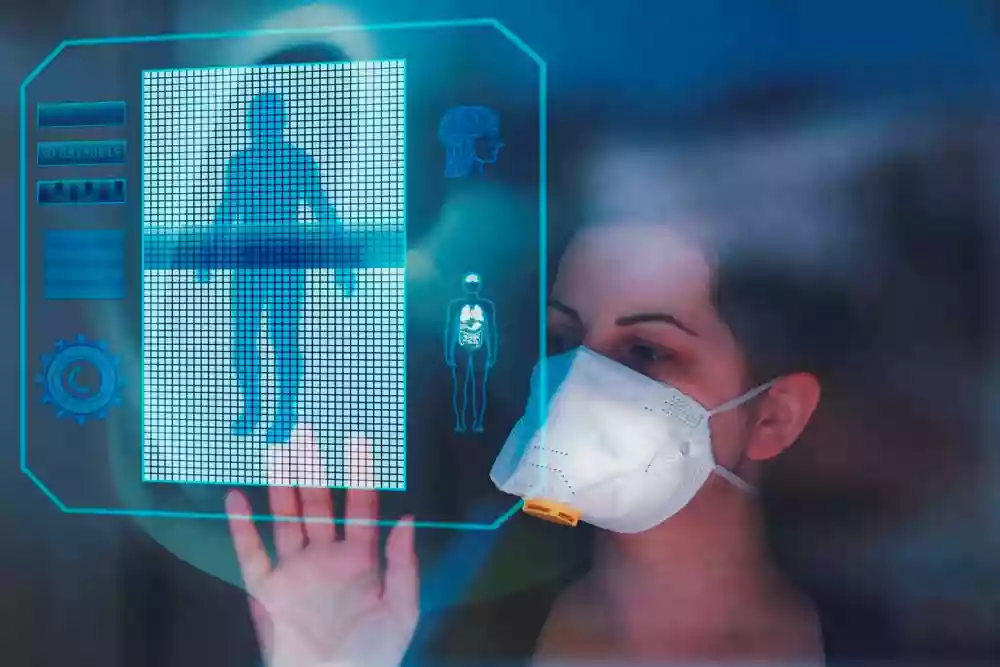Hey there! Ever wondered how tech is shaking up the healthcare scene? Well, Artificial Intelligence (AI) is the superhero in this story, making our health journey smarter and more personalized. this blog delves deep into the realm of ‘AI Health.’ Join us on this journey as we demystify the excitement surrounding AI and its pivotal role in shaping the future of healthcare. Welcome to the AI Health Revolution – where innovation meets compassion for a healthier tomorrow.
Unlocking the Mystery: How AI is Transforming Healthcare
AI isn’t just about robots; it’s about making your healthcare smarter. It acts like your personal health assistant, analyzing tons of data to provide accurate insights, ensuring quicker diagnoses and personalized treatment plans. Let’s break down the magic and see how it’s making waves in the real world.
Real-Life Examples: AI Health at Work
1. Chatbots for Health Guidance:
AI-powered chatbots are like having a health advisor at your fingertips. They answer your queries, offer advice, and provide information on-demand, making healthcare more accessible. Imagine having a knowledgeable friend available 24/7, ensuring you’re well-informed about your health.

Research Reference: Studies have shown that AI chatbots not only provide accurate health information but also contribute to improved health literacy among users.
2. Smart Wearables for Continuous Monitoring:
The future holds exciting possibilities as AI continues to evolve in healthcare. Here’s a glimpse:
Wearable devices with AI capabilities go beyond counting steps. They act as your personal health monitor, analyzing daily activities to predict potential health issues. This continuous monitoring is like having a health guardian on your wrist, always vigilant and ready to alert you to any deviations from the norm. Imagine these wearables evolving into advanced health monitors, providing real-time insights and even predicting potential health issues. Ongoing research is exploring the integration of AI into wearable devices for enhanced health monitoring.
3. Telehealth Revolution:
AI facilitates the expansion of telehealth services, offering remote diagnostics, virtual consultations, and AI-driven decision support. This not only improves healthcare accessibility but also ensures that quality care reaches individuals in diverse geographical locations.
4. Diagnostics: A Goldmine of Information
Research in the “Journal of Medical Internet Research” underscores that AI-driven diagnostic tools can match, and in some instances surpass, the accuracy of human doctors. This breakthrough suggests a paradigm shift in the way we approach medical diagnoses.

Diagnostics reports, ranging from imaging results to laboratory findings, provide a detailed snapshot of a patient’s health. By employing data analytics, healthcare professionals can identify correlations, detect early warning signs, and tailor interventions based on individual patient profiles. This approach not only improves diagnostic accuracy but also enables proactive and preventive care strategies.
5. The Potential of Electronic Health Records (EHRs):
Electronic Health Records (EHRs) have become very important for modern healthcare. Beyond serving as repositories of patient information, they hold the key to uncovering patterns and trends that can significantly impact patient care. By leveraging advanced analytics and artificial intelligence, healthcare providers can extract valuable insights from EHRs, leading to more informed decision-making and personalized treatment plans.
6. AI Health Personalized Treatment Plans:
AI’s ability to process and understand individual patient data enables the creation of personalized treatment plans. From tailoring medication regimens to predicting responses to therapies, AI ensures that treatments are finely tuned to each patient’s unique characteristics.
7. Efficient Workflow Management:
AI streamlines administrative tasks, optimizing workflow efficiency for healthcare professionals. This allows them to focus more on patient care, reducing administrative burdens and enhancing the overall healthcare experience.
Research Reference: Ongoing research explores the integration of AI into wearables for continuous health monitoring, emphasizing the early detection of health irregularities.
AI for Proactive Measures: Preventing Before Treating
Now, let’s talk about the exciting realm of AI in preventive measures against diseases. It’s not just about diagnosing; it’s about anticipating and preventing health issues before they escalate.
1. Predictive Analytics: Anticipating Health Trends
AI analyzes vast datasets, identifying patterns that may indicate potential health risks. By utilizing predictive analytics, AI can foresee health trends and alert healthcare providers and individuals. This proactive approach allows for early intervention and preventive measures.
Ongoing research explores AI’s potential in anticipating health trends and identifying early warning signs. This research emphasizes the shift from reactive to proactive healthcare, emphasizing preventive measures guided by data-driven insights.
The integration of data analytics and machine learning enables healthcare providers to move from reactive to proactive care. By analyzing historical data, patterns, and patient outcomes, predictive analytics can anticipate health trends, allowing for early interventions and personalized preventive measures. This shift towards anticipatory care significantly improves patient outcomes and reduces the burden on healthcare systems.
Example: In diabetes management, AI algorithms can predict blood sugar fluctuations based on lifestyle patterns, enabling individuals to make dietary and lifestyle adjustments to maintain stable glucose levels.

2. Genomic Analysis for Personalized Prevention:
AI doesn’t just look at your medical history; it dives into your DNA. Genomic analysis, powered by AI, helps identify genetic predispositions to certain diseases. Armed with this information, individuals and healthcare professionals can implement personalized preventive measures.
Example: AI-driven genomic analysis might reveal a higher risk of cardiovascular issues. With this knowledge, a tailored prevention plan involving lifestyle changes and targeted screenings can be devised.
AI Virtual Health Assistants: Your Personal Health Buddy for Customized Care
The rise of AI-driven virtual assistants is on the horizon. These digital companions will offer personalized health information, medication reminders, and lifestyle recommendations. It’s like having a friend who understands your health needs and supports you on your wellness journey. It deciphers your unique health code, tailoring treatments and interventions based on individual characteristics. This approach ensures that your health journey is not just efficient but also finely tuned to your specific needs.
Improving Population Health: Data-Driven Public Health Initiatives
AI’s analytical capabilities extend beyond individual patient care to inform public health initiatives. Identifying trends, understanding epidemiological patterns, and predicting disease outbreaks contribute to more effective and targeted public health strategies.
The collective analysis of electronic health data contributes to a broader understanding of population health. Public health initiatives can be better targeted and more effective when informed by comprehensive data insights. From identifying prevalent diseases to understanding social determinants of health, data-driven plans enhance the overall well-being of communities.
Navigating Challenges: Ethical AI and Patient Privacy
While the promises of AI health Revolution are vast, addressing ethical considerations and safeguarding patient privacy are imperative. Striking a balance between innovation and ethical standards ensures that the adoption of AI in healthcare aligns with the principles of patient-centered, responsible care.
Closing Thoughts: Embracing the AI Revolution in Healthcare
In conclusion, the integration of AI into healthcare is not just a technological advancement; it’s a transformative shift in the way we approach well-being. From real-life examples like AI chatbots to ongoing research pushing the boundaries of diagnostics and preventive care, AI is revolutionizing your health journey.
As you navigate the health landscape, consider the role of AI in modern healthcare can play in making your journey more personalized, informed, and proactive. The future is bright, and with AI as your health ally, you’re not just embracing technology – you’re embracing a healthier, more connected version of yourself. Here’s to the exciting AI revolution in healthcare and the limitless possibilities it brings to your well-being!
